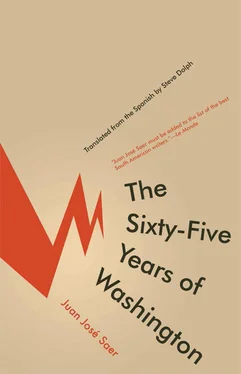Juan José Saer - The Sixty-Five Years of Washington
Здесь есть возможность читать онлайн «Juan José Saer - The Sixty-Five Years of Washington» весь текст электронной книги совершенно бесплатно (целиком полную версию без сокращений). В некоторых случаях можно слушать аудио, скачать через торрент в формате fb2 и присутствует краткое содержание. Год выпуска: 2010, Издательство: Open Letter, Жанр: Современная проза, на английском языке. Описание произведения, (предисловие) а так же отзывы посетителей доступны на портале библиотеки ЛибКат.
- Название:The Sixty-Five Years of Washington
- Автор:
- Издательство:Open Letter
- Жанр:
- Год:2010
- ISBN:нет данных
- Рейтинг книги:3 / 5. Голосов: 1
-
Избранное:Добавить в избранное
- Отзывы:
-
Ваша оценка:
- 60
- 1
- 2
- 3
- 4
- 5
The Sixty-Five Years of Washington: краткое содержание, описание и аннотация
Предлагаем к чтению аннотацию, описание, краткое содержание или предисловие (зависит от того, что написал сам автор книги «The Sixty-Five Years of Washington»). Если вы не нашли необходимую информацию о книге — напишите в комментариях, мы постараемся отыскать её.
The Sixty-Five Years of Washington — читать онлайн бесплатно полную книгу (весь текст) целиком
Ниже представлен текст книги, разбитый по страницам. Система сохранения места последней прочитанной страницы, позволяет с удобством читать онлайн бесплатно книгу «The Sixty-Five Years of Washington», без необходимости каждый раз заново искать на чём Вы остановились. Поставьте закладку, и сможете в любой момент перейти на страницу, на которой закончили чтение.
Интервал:
Закладка:
When he hears the second whistle, Leto realizes that, despite his distraction, he had also heard the first, and turns around. The thick arms, slightly elevated from the body, are buoyed in the air, and the head, which thinks itself elegant, and which certainly is, bobs a little, now that the Mathematician, in the stooped shoulders moving several meters ahead of him, has recognized Leto and begun to whistle so he’ll stop and wait for him. At the moment he recognizes him, Leto thinks: If he has just turned the corner, which is probably the case, since he lives on that street, he should have just passed the bicycle since, because it’s out of sight, the cyclist must also have turned the corner. The Mathematician, a head taller than him, arrives and holds out his hand. What’s up? he says. Without looking him in the eye, Leto responds vaguely. Well , he says, we’re walking along .
The Mathematician lets a hesitant smile linger. To Leto, his white moccasins, like his tan, seem premature, but the Mathematician knows that he just returned from Europe, where he spent three months touring factories, beaches, museums, and monuments with the annual Chemical Engineering alumni group. They’re out of control since they saw La Dolce Vita, he heard Tomatis say, with distracted disdain, the week before. And it was Tomatis, meanwhile, or so Leto heard him tell someone, who began calling him the Mathematician. He’s really not a bad guy, he often says, kind of a snob at worst, but, frankly, I don’t know what kind of sick satisfaction he gets from the physical sciences. Haven’t you noticed his tone when he talks to you about relativity theory? Because of his height he already has a tendency to look down on the world, but I’m just saying maybe it’s not our fault that multiplying the mass of a body with the speed of light squared equals the energy needed for the complete disintegration of that body? For a few seconds, the two young men, one tanned, blonde, tall, muscular, and handsome, dressed completely in white, including the moccasins he is wearing, sock-less, the other thinner, wearing glasses, with thick brown, well-combed hair, whose clothes are from first glance cheaper than the other’s, fifty centimeters apart, they remain silent, without animosity but without much to say either, each of them lost in his own thoughts, an internal swamp that stands in sharp contrast to the bright exterior, from which it was costing them an indescribable effort to emerge and where, because of the tendency to perceive the foreign with a rose tint, as they say, they simultaneously think that other would never be trapped. Without noticing, Leto, who, not knowing what to do, reaches his hand into his shirt pocket to remove the cigarettes, thinks that, for some reason, he is excluded from many of the worlds the Mathematician frequents, that the Mathematician is a species of astral being who belongs to a galaxy where everything is precise and luminous and that he, on the other hand, slogs through a viscous and darkened zone, which he is seldom able to leave, while the Mathematician, in spite of his elegant head, which is full of recent and colorful memories of Vienna, Amsterdam, Cannes, Málaga, and Spoleto, feels like he has been floating in the stratosphere for three months and that Leto, Tomatis, Barco, the Garay twins, and everyone else has taken advantage of his absence to live it up in the city. Finally, and concentrating on the act of opening his pack of cigarettes, in order not to be obligated to raise his head, Leo murmurs: And Europe, how was it?
— I hate resorting to a platitude, says the Mathematician offhandedly, but she’s a decadent old madam.
Leto does not suspect that, beneath the apparent disinterest and the generous estimation of those who have not traveled, the Mathematician fears that an over-admiring appreciation will disqualify him. And he hears him add: Just now, I’m off to distribute the press release from the Association to the papers. Goes without saying that whorehouses don’t figure in the expense report . Without realizing that the Mathematician is holding his unlit pipe by the stem, in his right hand, which is hanging against the seam of his pants, and that because of this, with a wave of his free hand, he rejects his offer, Leto, after tapping the bottom of the cigarette pack to remove three or four from the opening he has made in the top edge, holds out the pack toward the Mathematician, offering him one. So that the reason for his rejection is clear, the Mathematician brings the pipe to his mouth and holds it pressed between his ultra-white and even teeth. To stay so tan and so healthy, thinks Leto, he probably went rowing the day after he got back. While Leto lights the cigarette, the Mathematician, taking advantage of his distraction, induces him, by taking a few steps himself, to keep walking. They continue — or they pass — thanks to the faculty they possess, who knows why, from one point to another in space, gaining ground, so to speak, although the points between those they cross are all, with the two of them between, in each of the points, and in all of them at once, in the same place. No, seriously though , says the Mathematician, it’s an experience one should have —and what he calls experience are those memories that, although fresh and colorful, are no more accessible to himself than a packet of postcards of Amsterdam, of Vienna, of Capri, of Cadaqués, of San Gimignano. Siena is a rosy mirage, floating in the warm fog of the afternoon; Paris, an unexpected rainstorm; London, a problem finding hotel rooms and some manuscripts in the British Museum. While he listens, Leto puts images to the names that echo in the warm morning, and these images, which he forms with assorted memories that have been rescued from disparate experiences and have no real connection to the names he hears, are neither more nor less pertinent or relevant than the Mathematician’s memories, which are unable to render the thing more accessible even when they come from what the Mathematician could call his experience. The names of cities pass as though fixed to an endless mountain range or to a carousel, in the same way that, periodically, in spite of the variations and supplements, sooner or later the same names reappear in the memory of the Mathematician, who makes them sound to Leto’s ears as though they came from an instrument: La Baule, even though it was the middle of summer the sea was frigid; Prague, a great portion of Kafka’s work makes sense when you get there; Bruges, they painted what they saw; Paris, an unexpected rainstorm. Suddenly the Mathematician, who is walking closest to the wall, jumps sideways, pushing aside Leto who, staggering, stumbles a little but keeps walking: as they arrived at the corner, the Mathematician, concentrating on his story, was startled to see appear, abruptly, although always maintaining his placid and undulating pedaling, the kid on the bicycle who, in the time it took them to walk to the corner, has gone around the block. A furious, somewhat ostentatious silence interrupts, after the scare, the chain of recollections from the Mathematician, who stops and turns and sees move away, on the gray sidewalk, under the trees, the slow bicycle with its metallic, discrete, and complicated sounds. Leto, who has kept walking, gains a few steps on him and stops to wait, just beyond the oblique border of the shade of the houses. The Mathematician reaches him, smiling and shaking his head. If he’d run you over , says Leto, he’d have stained your pants .
— I’d kick him to pieces, says the Mathematician, showing with his playful tone that there’s no way he would. He seems less like a flesh and bone person than one of those archetypes you see on billboards, those for whom every contingency inherent to humanity has disappeared. His physical appearance, perfected by his European tan and the whiteness of his clothing, is nothing but the consequence of his biographical perfections: in spite of having been a star on the university’s rugby club, he has, as Tomatis puts it, something slightly more dense filling his head than usually fills up a rugby ball. Though more than a few hectares in the north of the province, near Tostado, belong to him, the Mathematician’s father, a scrupulous yrigoyenista , abhors oligarchs and soldiers and is one of the old liberal lawyers whose name appears at the bottom of the habeas corpus appeals of almost all of the political prisoners in the city, and the Mathematician, unlike his older brother, who is also a lawyer but who has accepted official posts in almost every government — the Mathematician, I was saying, no? — has not only followed the liberal tradition of his father and his maternal grandfather but also, at some point, four or five years back, was a founding member of one of the Trotskyite or socialist reform groups that, after 1955, began to proliferate. But the Mathematician is a thinker and not an activist, a scrutinizer, not an organizer, and not a practician but a theoretician. He likes treatises more than gatherings and prefers futurist manifestos to the builders of the future. His engineering studies are, no doubt, the result of some familial strategy aimed at confronting, with the corresponding diploma, the national development that will one day obligate the heirs to move from passive ownership of the land to industrial investment. They can be as liberal as you want , Tomatis likes to say, malevolently, but they don’t do anything without a motive . The Mathematician, who possibly intuits skepticism or mistrust in Tomatis’s wit, continues impassively in the role he’s assigned himself: the supplier — without, in reality, it ever having been lost since no one noted its absence — of a logical rigor and an exactitude in information that, because of his insistence, makes him annoying to argue with. Actually what Tomatis faults the Mathematician for is his literalness. If, for example, in the middle of a discussion Tomatis cites a German philosopher, by the following week the Mathematician has read all of his work, and he comes back with the intention of returning to the point where the discussion left off the week before. Tomatis has cited this philosopher offhandedly, not because he considers wasting your youth and frying your eyelashes reading his treatises essential, but he is too vain to sidestep the argument. Because of his credulity, the Mathematician is more informed than the rest of them, since all it takes is hearing someone mention an author for him to read their complete works and reappear fifteen days later, refreshed and calm, to have a conversation about them. To be fair, there isn’t much to fault him for , thinks Leto. Because he isn’t even someone who wants to win an argument at any cost; he is kind, modest, and generous. Except, thinks Leto, except when he resorts, without being aware of it, I’m sure, to his magnificent axioms, postulates, and definitions. Then he starts acting like the Werewolf during a full moon, or Jack the Ripper in the company of hookers.
Читать дальшеИнтервал:
Закладка:
Похожие книги на «The Sixty-Five Years of Washington»
Представляем Вашему вниманию похожие книги на «The Sixty-Five Years of Washington» списком для выбора. Мы отобрали схожую по названию и смыслу литературу в надежде предоставить читателям больше вариантов отыскать новые, интересные, ещё непрочитанные произведения.
Обсуждение, отзывы о книге «The Sixty-Five Years of Washington» и просто собственные мнения читателей. Оставьте ваши комментарии, напишите, что Вы думаете о произведении, его смысле или главных героях. Укажите что конкретно понравилось, а что нет, и почему Вы так считаете.












